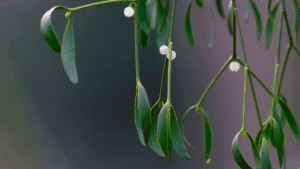
Mistletoe (Viscum album)
Mistletoe (Viscum album) Every Christmas, mistletoe hangs above doorways, inviting

This blog was inspired by Hilery Dorrian’s recent Clinical Therapeutics session in CHE PRO on the elderly; a sneak peek at her 10-month Master Practitioner Mentorship Programme starting this month.

Homeopath and CHE Community Manager
As professional homeopaths, we often navigate the complex terrain of cognitive decline, particularly in elderly patients or those with a history of vascular issues. Among the remedies for cognitive and cerebrovascular compromise, Baryta Carbonica (Baryta Carb) occupies a unique and significant place, especially for individuals exhibiting vascular vulnerability, aneurysmal tendencies, or post-stroke cognitive deficits.
This article explores the rationale and clinical applications of Baryta Carb in these contexts, delving into why it is so well-suited for the brain and cognitive functions.
Baryta Carbonica is traditionally associated with the elderly, the senile, and those with premature aging processes, particularly where there is cerebral atrophy, memory impairment, or diminished nerve vitality. Its homeopathic profile reflects a deep constitutional vulnerability, often manifesting as:
A particularly striking symptom in Baryta patients with dementia is the reversion to earlier emotional states, often manifested in behaviors such as calling for “mummy” or seeking parental-like comfort. This regression highlights the fragile, childlike inner world that emerges as cognitive and memory functions decline, and it can serve as a valuable guiding symptom for remedy selection.
At a deeper level, Baryta Carb addresses the structural weakness of tissues, particularly in the vascular system and the nervous system. This makes it especially relevant for vascular dementia, post-stroke sequelae, and aneurysmal tendencies, all of which involve compromised cerebral circulation and neuronal degeneration.
Vascular dementia is characterised by cognitive decline due to reduced blood flow to the brain, often resulting from small or large vessel disease. Patients may present with:
Baryta Carb is indicated when cognitive decline is accompanied by arterial weakness, hypertension, or a history of circulatory issues. Its action can be understood on both a constitutional and tissue level:
Strokes produce sudden disruptions in cerebral circulation, leading to focal neurological deficits. Homeopathically, Baryta is valuable for patients who experience:
The rationale for Baryta lies in its regenerative and structural effects on the nervous system, complementing conventional rehabilitation by:
Though less commonly addressed, patients with aneurysmal tendencies or a family history of arterial weakness may benefit from constitutional Baryta prescribing. The remedy is particularly relevant where:
Homeopathically, Baryta’s action reflects a strengthening and stabilising influence on the vascular connective tissue, which may indirectly support cerebral and systemic resilience.
Why is Baryta Carb especially indicated for the brain?
Baryta Carbonica offers a profound homeopathic approach to cognitive decline associated with vascular compromise, strokes, and aneurysms. Its unique ability to address structural, mental, and emotional vulnerability; including childlike regression such as calling for “mummy”, makes it an invaluable tool for professional homeopaths working with elderly or frail patients. By recognizing the subtle signs of cerebral, vascular, and emotional fragility, we can employ Baryta to support the brain’s integrity, memory function, and overall cognitive resilience, providing holistic care in challenging neurological cases.
Click the button below to find out more about Hilery Dorrian’s 10-month Master Practitioner Mentorship Programme and gain deeper insights into working therapeutically with the elderly.
If you found this post helpful, you’ll love what’s waiting for you inside CHE Pro; our professional membership for homeopaths who want to keep growing, learning, and feeling supported in practice.
Whether you’re newly qualified or decades into practice, CHE Pro is your home for ongoing support and brilliant homeopathic education.
We’d love to welcome you in.
Disclaimer
The content shared here is intended for informational purposes only and should not be considered a replacement for professional medical advice, diagnosis, or treatment from a qualified and licensed healthcare provider. The views and opinions expressed in this presentation are those of the presenter and do not necessarily represent those of CHE or any affiliated organizations.

Mistletoe (Viscum album) Every Christmas, mistletoe hangs above doorways, inviting

Your Guide to Calc Tissue Salts Tissue salts, also known

Natrum Muriaticum vs Nitric Acid: When Defensive Minds Look Alike
